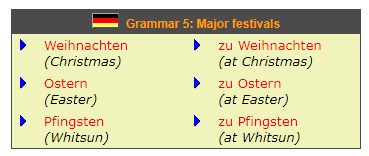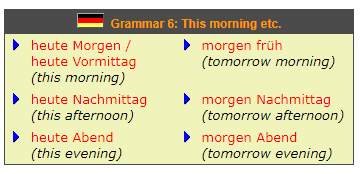The German flag Grammar 4: An welchem Tag?
Wann / An welchem Tag gehen Sie?
(When / On which day are you going?)
Wir gehen am vierten Mai
(We're going on the fourth of May)
Wir gehen am Vierten
(We're going on the fourth)
Wir gehen am Mittwoch, dem/den vierten Mai
(We're going on Wednesday, the fourth of May)
Wir gehen am 4. Mai
(We're going on May 4th)
Wir gehen am 4.5.2008
(spoken: am vierten, fünften, zweitausendacht)
(We're going on 4th May 2008)
In the third response, you can either use the dative or the accusative of the definite article when you are giving the day of the week followed by the date. It is more formal to use the dative of the article.
Note in particular the word order when you say on what day your birthday falls. The word "Geburtstag" will always be the final element in the clause:
Wann hast du Geburtstag?
(When is your birthday?)
Ich habe am vierten Mai Geburtstag.
(My birthday is on the fourth of May.)

(In south German, "an" is often used rather than "zu" with these festivals.)
This morning/afternoon/evening
The table below gives the phrases needed to say at what part of the day you wish to do something:


 英语
英语 日语
日语 韩语
韩语 法语
法语 西班牙语
西班牙语 意大利语
意大利语 阿拉伯语
阿拉伯语 葡萄牙语
葡萄牙语 越南语
越南语 俄语
俄语 芬兰语
芬兰语 泰语
泰语 丹麦语
丹麦语 对外汉语
对外汉语

